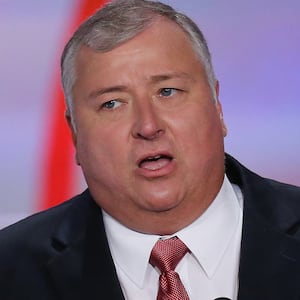Ohio’s top state lawmaker conspired to funnel tens of millions of dollars from the state’s electric utility to his political allies in order to consolidate power over the state legislature and shepherd through a $1.5 billion bailout for the utility’s nuclear power plants, federal prosecutors alleged on Tuesday.
The FBI arrested Ohio speaker Larry Householder, a Republican, and four alleged co-conspirators and leveled charges of racketeering and bribery related to the scheme. At a press conference on Tuesday afternoon, U.S. Attorney David DeVillers called it “likely the largest bribery [and] money laundering scheme ever perpetrated against the people of the state of Ohio.”
At the center of the scheme was Householder, who prosecutors say used a nonprofit “dark money” group called Generation Now to funnel money from the utility, First Energy, into state-level political contests. Householder’s goals, DeVillers said, were to pass and preserve a contentious bill to bail out two FirstEnergy nuclear plants, and “to build a power base for Larry Householder.”
After his arrest, Ohio Gov. Mike DeWine called on the speaker to “resign immediately.”
“I am deeply concerned about the allegations of wrongdoing issued today by the U.S. Attorney’s Office. Every American has the presumption of innocence until proven guilty,” DeWine tweeted Tuesday. “Because of the nature of these charges, it will be impossible for Speaker Householder to effectively lead the Ohio House of Representatives; therefore, I am calling on Speaker Householder to resign immediately. This is a sad day for Ohio.”
Four political consultants with ties to Householder were also arrested and charged with complicity in the scheme. Prosecutors said the co-conspirators routed money provided by FirstEnergy to Generation Now through a network of dark money groups and political consulting firms in order “to hide that the money was coming from Generation Now.”
The money was used to help elect Householder allies to the statehouse, and to promote legislation propping up FirstEnergy assets. According to prosecutors, the money provided by the utility was used to help elect 21 state legislators. All of them subsequently voted to make Householder the statehouse speaker in 2019. All but one voted for the FirstEnergy bailout.
The Daily Beast detailed a host of connections between Householder, Generation Now, and political forces in Columbus pushing the FirstEnergy bailout in a series of stories in 2018 and 2019. Householder consistently denied involvement with the dark money group, and insisted he had no financial interest in the bailout. Both claims, prosecutors said, were flatly untrue.
Prosecutors did not name FirstEnergy at the press conference on Tuesday, only referring to it as Company A, but left no doubt that it was the company at issue. “Everybody in this room knows who Company A is,” DeVillers said.
FBI agents and local authorities stormed Householder’s Glenford farm on Tuesday morning. Others who were arrested included Neil Clark, a lobbyist and founder of Grant Street Consultants; former Ohio Republican Party chair Matthew Borges; Juan Cespedes, co-founder of The Oxley Group in Columbus; and one of Householder’s advisers, Jeffrey Longstreth.
The investigation into the Republican lawmaker centers on House Bill 6, a $1 billion bailout plan for two Ohio nuclear power plants—which Householder notably helped push through last year, according to Cleveland.com. The bill was signed by DeWine in June and was immediately met with efforts to overturn the bailout.
Those efforts have since failed after receiving fierce resistance from several well-funded groups, including Generation Now. The company is a 501(c)(4) nonprofit—meaning it can engage in political advocacy without disclosing its donors—but The Daily Beast has previously reported on its deep ties to Householder.
Generation Now was the primary node of a Householder-linked Columbus political machine, which funneled money to statehouse allies using millions of dollars in untraceable political donations. The group pressed for state assistance for two nuclear power plants run by FirstEnergy. It also ran polling for Householder and his allies during the 2018 election cycle, according to memos quietly posted to an otherwise-blank website affiliated with Generation Now. Some of those memos contained metadata indicating they were created by Longstreth, the longtime Householder adviser who was arrested on Tuesday, and another employee of his consulting firm.
Generation Now provided more than $1 million during the 2018 cycle to a political group, Growth & Opportunity PAC, that spent the funds in support of a number of Householder allies. The PAC has received another $1.1 million since last year from a similarly named dark money group, the Coalition for Growth and Opportunity. The PAC has once again spent that money on ads backing Householder allies in Ohio.
When Growth & Opportunity PAC began running ads on a Cincinnati NBC affiliate this year, the station tried, unsuccessfully, to suss out information on the people running the group. “Asked buyer for additional names,” the station wrote in a filing with the Federal Communications Commission. “None were provided.”
“It takes courage for citizens to assist law enforcement in the ways detailed in the affidavit,” DeVillers said Tuesday. “We are grateful to those who felt a moral duty to work together with agents in bringing to light this alleged, significant public corruption.”
Householder is the first Ohio lawmaker in 60 years to win back the speakership after leaving due to term limitations, which he did in 2019 after serving from 2001 to 2004. He is considered one of the three most powerful politicians in Ohio and a politician whose current influence dictates how the state spends more than $140 billion annually.
Tuesday’s investigation is not the first time Householder has been the subject of an FBI investigation. In 2004, the FBI launched an investigation into allegations that he and his aides took kickbacks from various vendors and traded political favors for campaign contributions. The investigation ended two years later and no charges were filed against the Republican. About 13 years later, in January 2017, Householder mounted a successful campaign to become the first lawmaker to recapture the speakership—a post dictated by term limits—in nearly six decades.








